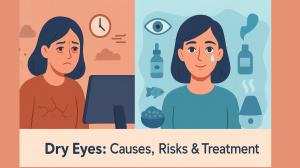LogsDay Reports: Millions Ignore Dry Eyes Treatment — Until It’s Too Late
Millions ignore dry eyes, risking vision damage. LogsDay explains causes, symptoms, treatments, and when to see a doctor.
PUNE, MAHARASHTRA, INDIA, September 17, 2025 /EINPresswire.com/ -- 𝐋𝐨𝐠𝐬𝐃𝐚𝐲, a leading lifestyle and wellness news publisher, issued a health alert revealing that millions of people worldwide are choosing to ignore dry eyes symptoms. What many dismiss as mild discomfort may result in serious risks if not treated early. The article “𝐖𝐡𝐲 𝐌𝐢𝐥𝐥𝐢𝐨𝐧𝐬 𝐈𝐠𝐧𝐨𝐫𝐞 𝐃𝐫𝐲 𝐄𝐲𝐞𝐬 — 𝐔𝐧𝐭𝐢𝐥 𝐈𝐭’𝐬 𝐓𝐨𝐨 𝐋𝐚𝐭𝐞” outlines what causes dry eye syndrome, the progression of untreated dry eyes, the best dry eyes treatment options, and when to consult a medical professional.
𝐊𝐞𝐲 𝐓𝐚𝐤𝐞𝐚𝐰𝐚𝐲𝐬
• Common triggers for dry eyes include prolonged screen use, aging (particularly after 50), hormonal changes (notably during menopause), exposure to dry climates or wind, medical conditions such as diabetes or autoimmune disorders, contact lens wear, and certain medications.
• Early symptoms are mild: itching, burning, gritty sensation, slight blurriness. When neglected, they can lead to serious issues such as corneal damage, inflammation, ulcers, and vision impairment.
• Available dry eyes treatment options range from over-the-counter artificial tears and lifestyle adjustments (screen breaks, humidity control) to nutritional support (omega-3 fatty acids, hydration), and medical treatments including prescription drops, in-office procedures, and punctal plugs.
• It is important to see an eye doctor if symptoms persist beyond two weeks, if pain or light sensitivity develops, or if daily activities like reading, driving, or screen work become difficult.
𝐄𝐱𝐩𝐞𝐫𝐭 𝐈𝐧𝐬𝐢𝐠𝐡𝐭𝐬
“𝑴𝒂𝒏𝒚 𝒔𝒆𝒆 𝒅𝒓𝒚 𝒆𝒚𝒆 𝒂𝒔 𝒂 𝒏𝒐𝒓𝒎𝒂𝒍 𝒑𝒂𝒓𝒕 𝒐𝒇 𝒂𝒈𝒊𝒏𝒈 𝒂𝒏𝒅 𝒔𝒐𝒎𝒆𝒕𝒉𝒊𝒏𝒈 𝒕𝒐 𝒆𝒏𝒅𝒖𝒓𝒆,” says Dr. Piotr Woźniak, a refractive surgeon and dry eye specialist. “𝑨 𝒔𝒊𝒎𝒑𝒍𝒆 𝒆𝒚𝒆 𝒅𝒓𝒐𝒑 𝒄𝒐𝒖𝒍𝒅 𝒐𝒇𝒇𝒆𝒓 𝒔𝒊𝒈𝒏𝒊𝒇𝒊𝒄𝒂𝒏𝒕 𝒓𝒆𝒍𝒊𝒆𝒇 – 𝒃𝒖𝒕 𝒎𝒂𝒏𝒚 𝒑𝒆𝒐𝒑𝒍𝒆 𝒂𝒓𝒆𝒏’𝒕 𝒆𝒗𝒆𝒏 𝒂𝒔𝒌𝒊𝒏𝒈 𝒇𝒐𝒓 𝒉𝒆𝒍𝒑.”
“𝗘𝗮𝗿𝗹𝘆 𝗱𝗲𝘁𝗲𝗰𝘁𝗶𝗼𝗻 𝗮𝗻𝗱 𝘁𝗿𝗲𝗮𝘁𝗺𝗲𝗻𝘁 𝗼𝗳 𝗱𝗿𝘆 𝗲𝘆𝗲𝘀 𝗮𝗿𝗲 𝗻𝗼𝘁 𝗷𝘂𝘀𝘁 𝗮𝗯𝗼𝘂𝘁 𝗰𝗼𝗺𝗳𝗼𝗿𝘁 — 𝗽𝗿𝗼𝘁𝗲𝗰𝘁𝗶𝗻𝗴 𝘆𝗼𝘂𝗿 𝘃𝗶𝘀𝗶𝗼𝗻 𝗺𝗲𝗮𝗻𝘀 𝗮𝘃𝗼𝗶𝗱𝗶𝗻𝗴 𝗹𝗼𝗻𝗴-𝘁𝗲𝗿𝗺 𝗱𝗮𝗺𝗮𝗴𝗲 𝗮𝗻𝗱 𝗽𝗼𝘁𝗲𝗻𝘁𝗶𝗮𝗹𝗹𝘆 𝘃𝗶𝘀𝗶𝗼𝗻 𝗹𝗼𝘀𝘀.” — Dr. Aisha Kumar, ophthalmologist with over 15 years’ experience, Mumbai Eye Institute.
𝐖𝐡𝐲 𝐓𝐫𝐞𝐚𝐭𝐦𝐞𝐧𝐭 𝐎𝐟𝐭𝐞𝐧 𝐆𝐞𝐭𝐬 𝐃𝐞𝐥𝐚𝐲𝐞𝐝
Many delay care because they believe dry eyes are just a natural part of aging, or assume over-the-counter drops will solve the issue. Others might be more focused on trending health topics, overlooking the risks of untreated dry eyes. Studies show that while over half of adults in the US and Europe report symptoms, only about 17-20% obtain formal diagnosis. Delay makes treatment more difficult, more expensive, and damage harder to reverse.
𝐖𝐡𝐚𝐭 𝐘𝐨𝐮 𝐂𝐚𝐧 𝐃𝐨 𝐍𝐨𝐰: 𝐏𝐫𝐞𝐯𝐞𝐧𝐭𝐢𝐯𝐞 𝐌𝐞𝐚𝐬𝐮𝐫𝐞𝐬 & 𝐓𝐫𝐞𝐚𝐭𝐦𝐞𝐧𝐭 𝐎𝐩𝐭𝐢𝐨𝐧𝐬
1. Monitor symptoms: Itching, burning, feeling of something in the eye, blurry vision. If they last more than a couple of weeks or worsen, consult an eye care professional.
2. Lifestyle changes: Follow the 20-20-20 rule (every 20 minutes, look 20 feet away for 20 seconds), protect eyes from wind, use humidifiers, reduce screen glare.
3. Lubrication: Use artificial tears or lubricating eye drops for mild to moderate dry eyes.
4. Nutrition & hydration: Include omega-3 fatty acids (e.g. in salmon, flax seeds), stay well hydrated, reduce alcohol and caffeine which may dehydrate.
5. Medical treatments when needed: Prescriptions for inflammation, in-office procedures, or use of punctal plugs if tear drainage needs correction.
𝐖𝐡𝐞𝐧 𝐭𝐨 𝐒𝐞𝐞 𝐚 𝐃𝐨𝐜𝐭𝐨𝐫
It is time to consult a specialist if:
• Symptoms last more than two weeks despite home care.
• Pain, redness, light sensitivity, or changes in vision occur.
• Daily life tasks like reading, driving at night, or using screens become difficult.
𝐀𝐛𝐨𝐮𝐭 𝐋𝐨𝐠𝐬𝐃𝐚𝐲
LogsDay is a digital platform dedicated to wellness, lifestyle, and trending news. It delivers practical insights, expert-backed health content, and actionable tips to help readers protect their well-being.
𝐑𝐞𝐥𝐚𝐭𝐞𝐝 𝐓𝐨𝐩𝐢𝐜𝐬
For readers interested in understanding the broader landscape of health anxieties, including why people often postpone medical attention, read more about 𝐟𝐞𝐚𝐫 𝐨𝐟 𝐭𝐡𝐞 𝐝𝐞𝐧𝐭𝐢𝐬𝐭 𝐚𝐧𝐝 𝐨𝐭𝐡𝐞𝐫 𝐜𝐚𝐫𝐞-𝐚𝐯𝐨𝐢𝐝𝐚𝐧𝐜𝐞 𝐛𝐞𝐡𝐚𝐯𝐢𝐨𝐫𝐬 here.
KOYEL GHOSH
Founder & Researcher, LogsDay
koyel@logsday.com
Visit us on social media:
LinkedIn
Instagram
Facebook
YouTube
X
Legal Disclaimer:
EIN Presswire provides this news content "as is" without warranty of any kind. We do not accept any responsibility or liability for the accuracy, content, images, videos, licenses, completeness, legality, or reliability of the information contained in this article. If you have any complaints or copyright issues related to this article, kindly contact the author above.

